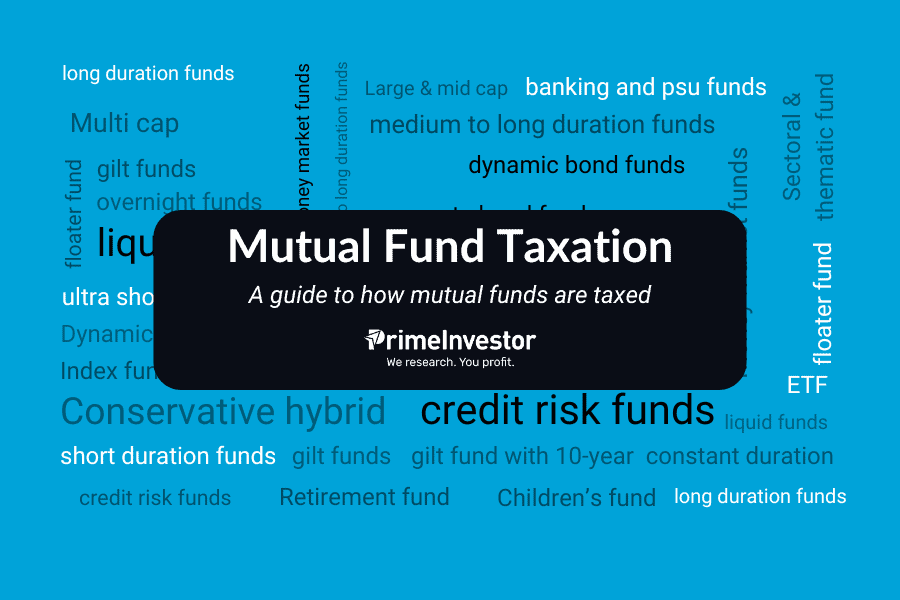Mutual fund investing saves you a lot of hassles – you don’t have to break your head over which stocks or bonds to invest in, you’re saved the stress of obsessively tracking markets and you can opt to take the SIP route to let your investing run on auto pilot.
But there is one ‘hassle’ that it does not do away with and that is of taxation. This blog will simplify how different mutual funds are taxed. Here is a full explanation on how different mutual funds are taxed especially in light of the changes brought about by Union Budget 2024.
Use the Table of Contents below to navigate to the section of your choice.

Returns on mutual funds and their tax treatment
Returns on mutual funds can take two forms.
#1 IDCW (formerly known as dividend)
IDCW that expands to Income distribution cum Capital Withdrawal, refers to the payouts that are made periodically by a mutual fund when you as an investor choose the ‘IDCW’ option and not the ‘Growth’ option. IDCW was formerly known as ‘dividend’ but SEBI changed this to more accurately represent that the payouts are not only gains on the investments but also part of the investments that are stripped off and paid out. Read more on IDCW in mutual funds here.
For the purposes of tax treatment, IDCW payouts are taxable in the hands of the investor. IDCW payouts will be included under the head ‘Income from other sources’ and will be taxed at the slab rate applicable to you. IDCW payouts will be taxable in the financial year in which you receive them even if you continue to stay invested in the mutual fund.
#2 Capital Gains
Simply put, this is the difference between the value you get when you redeem your units in the mutual fund and the amount you originally invested. These gains are taxed only when they are realised, i.e. when the units are actually redeemed.
Capital gains on mutual funds are not taxed uniformly. The factors that will determine how they are taxed are as follows:
- In which asset classes the fund’s assets are invested in and the proportion. There are 3 classifications here. One, 65% and above in domestic equities. Two, 65% above in debt instruments. Three, all other allocations.
- The length of time for which the units were held.
- The date of redemption & date of investment for some mutual fund categories.
Mutual fund taxation across fund categories
Now let’s apply this to the various categories of mutual funds as defined by SEBI’s Categorisation and Rationalisation of Mutual Fund Schemes.
SEBI has grouped mutual fund schemes into
- Equity schemes
- Debt schemes
- Hybrid schemes
- Solution oriented schemes
- Other Schemes
#1 Taxation of Equity schemes or equity mutual fund taxation
The following ten scheme categories fall under ‘equity schemes’ and the table below highlights the proportion of domestic equity investment these fund categories are required to have. This in turn determines the way that capital gains on redemption are taxed.
In all these schemes, the criteria of over 65% of total assets being invested in domestic equity is met. The cut-off holding period for long term capital gains is 12 months. The tax on capital gains as follows:
For redemptions made before July 23, 2024
- Long term capital gains taxed at flat 10%
- Short term capital gains taxed at flat 15%
Budget 2024 brought in some changes. For redemptions made after July 23, 2024, gains would be taxed as follows:
- Short term capital gains will be taxed at 20% (increased from 15%)
- Long term capital gains will be taxed at 12.5% with an increased exemption limit of Rs. 1.25 lakhs compared to Rs 1 lakh earlier.
Please note that for investments made up to January 31st, 2018, capital gain up to this date is tax-free.
#2 Debt schemes – debt fund taxation
The table below lists all the categories of debt funds – where there is no investment in equity. All the categories have the same tax treatment as given further below. These funds come under the 'Specified Mutual Funds' definition - which are funds that invest at least 65% of their portfolio in debt instruments, or are fund-of-funds that invest at least 65% of their portfolio in such funds.
For investments made on or after April 1, 2023: Capital gains will be added to total income and taxed at the slab rate applicable to you. There will be no distinction between long term and short-term holding period for the these funds.
For investments made before April 1, 2023: In line with the changes proposed by Budget 2024, capital gains on investments made prior to April 1 2023 will be taxed as follows:
- Short-term capital gains: Short term holding period cut off is 24 months (as against 36 months earlier). Short term capital gains will be added to your income and taxed as per your slab rates.
- Long term capital gains: Long term holding period is above 24 months. Gains will be taxed at flat 12.5% with no indexation (against 20% with indexation benefit that was there earlier).
- Please note that on investments made before April 1, 2023 but redeemed before July 23, 2024, the gains will continue to be taxed the old way i.e. gains on funds held for longer than 36 months will be taxed at 20% with indexation and short term capital gains will be added to your income and taxed at your slab rates.
#3 Hybrid schemes
The sub-categories of funds in the hybrid category can invest in varying combinations of equity, debt, commodity (gold) and equity/debt/commodity derivatives. It is important to note that their tax treatment essentially depends on the asset allocation of the portfolio.
Funds with > 65% of the portfolio invested in domestic equity (including equity derivatives). This covers the following categories:
- Arbitrage funds
- Equity savings funds
- Aggressive hybrid funds
- Balanced advantage, solution oriented and multi-asset funds where the gross equity (stocks plus derivatives) is at least 65%.
These funds are taxed like equity funds. Please see the section above on equity funds for details.
Funds with > 65% of the portfolio invested in debt instruments (called Specified Mutual Funds). This covers the following categories that are taxed like debt funds (above) and this covers:
- Conservative hybrid funds
- Solution oriented, multi-asset, and balanced advantage funds where debt allocation is over 65%
These funds are taxed like debt funds. Please see the section above on debt funds for details.
Hybrid funds with 35% to 65% in equity – this includes funds that are not debt oriented or equity oriented and covers:
- Balanced hybrid funds
- Multi-asset, balanced advantage and solution oriented funds that hold less than 65% in domestic stocks and equity derivatives and less than 65% in debt instruments.
Gains on redemptions of these funds will be taxed as follows.
For Redemptions made before July 23, 2024
- Short term capital gains (less than 36 months) will be added to your income and taxed at your slab rates
- Long term capital gains (more than 36 months) will be taxed at 20% with indexation.
For Redemptions made after July 23, 2024
- Short term capital gains: Short-term holding is less than 24 months. Gains will be taxed at your slab rate.
- Long term capital gains: Long-term holding 24 months & above. Gains will be taxed at 12.5% without indexation..
The table below summarises the characteristics and tax treatments of the various scheme categories that fall under the head ‘Hybrid Funds’.
#4 Solution Oriented Schemes
These funds are varied forms of hybrid funds (or pure equity funds) and their taxation would entirely depend on their equity holding.
#5 Other Schemes – Fund of Funds, gold funds, international funds, ETFs
Fund of Funds (FoFs) are a category of funds that invest a minimum of 95% in other mutual funds or ETFs. Tax treatment would depend on where the funds are invested. FoF types are as follows:
- FoFs that invest 90% or more in equity ETFs will be treated like equity funds and will be taxed accordingly. Please see the section on equity fund taxation for details.
- FoFs that invest 65% or more in debt funds will be defined as a Specified Mutual Fund and treated like debt funds for taxation. Please see the section on debt fund taxation for details.
- All other FoFs will fall into one bucket.
Gold funds and international funds have seen a change in definition. Until April 1, 2025 these funds will be treated as debt funds for the purpose of taxation. From April 1, 2025 onwards, these funds will no longer be bracketed along with debt funds and will have a separate taxation.
Taxation on FoFs other than (1) and (2) above, gold funds, and international funds will depend on the date of investment and date of redemption.
Investments made before April 1, 2023 and redeemed before July 23, 2024:
- Long term capital gains (held for over 3 years) taxed at 20% with indexation benefit.
- Short term capital gains are taxed at the slab rate applicable to you.
Investments made on or after April 1, 2023 and redeemed before April 1, 2025:
Capital gains will be added to total income and taxed at the slab rate applicable to you. There will be no distinction between long term and short-term holding period.
Investments made before April 1st, 2023 and sold between 23rd July 2024 and April 1st, 2025:
- A holding period of less than 24 months is short term. Short term capital gains will be added to your income and taxed at your slab rate.
- Long term capital gains will be taxed at 12.5% without indexation.
Investments made at any time and sold after March 31, 2025:
Long-term capital gain: A holding period of 24 months & above is long-term. Long term capital gains will be taxed at 12.5% without indexation.
For ETFs, the taxation is as follows:
- Equity ETFs will be taxed like equity funds. Please see the section on equity funds for details.
- Debt ETFs, per current understanding and AMC communications, will be taxed like debt funds. The confusion arises as the July 2024 budget clubbed all listed securities together and applied a uniform tax treatment – this would have put debt ETF taxation at a significant advantage over debt funds and created a tax anomaly. Gold and international ETFs will be treated as listed securities for tax purposes. Short-term holding cutoff is 12 months and gains will be taxed at 20%. Long-term gains will be taxed at 12.5% without indexation.
Please note that the distinction in taxation based on the redemptions prior to and post July 23, 2024 explained above is based on our inference from budget documents and the Finance Bill.






8 thoughts on “Mutual Fund Taxation – A guide to how mutual funds are taxed”
Hi,
This is regarding LTCG on Debt funds purchased prior to 1st Apr 2023. You mentioned, the tax is 20% with indexation benefit. However, as per my reading, taxpayer can also opt for 10% tax without indexation benefit, if this option is more beneficial to taxpayer. Kindly clarify.
Hello,
Please see below excerpt from section 112 of the Income Tax Act. This benefit of choosing 10% without indexation is not available after July 10, 2014.
Hope this answers your query.
“Provided that where the tax payable in respect of any income arising from the transfer of a long-term capital asset, being listed securities (other than a unit) or zero coupon bond, exceeds ten per cent of the amount of capital gains before giving effect to the provisions of the second proviso to section 48, then, such excess shall be ignored for the purpose of computing the tax payable by the assessee :
Provided further that where the tax payable in respect of any income arising from the transfer of a long-term capital asset, being a unit of a Mutual Fund specified under clause (23D) of section 10, during the period beginning on the 1st day of April, 2014 and ending on the 10th day of July, 2014, exceeds ten per cent of the amount of capital gains, before giving effect to the provisions of the second proviso to section 48, then, such excess shall be ignored for the purpose of computing the tax payable by the assessee.”
Good Summary, is there a way we can filter out Hybrid funds that qualify for Indexation benefit (i.e >35% Equity)? Right now, it seems that we have to research individually. A filter would be of immense value in shortlisting candidates for further analysis.
We show the latest allocation in MF screener but this is not simple as for qualification for tax purpose, the average of 180 days is taken. Also, it can change drastically later. Please read this article to know why. https://www.primeinvestor.in/should-you-choose-hybrid-funds-instead-of-debt-funds-for-tax-benefits/
Thanks a lot for a nutshell overview.
very nice article, is it possible to put the Scheme category in MF SCREENER , so that it becomes easy for us to undetstand what taxation will apply to which MF scheme
Hello
A very lucid guide Bonds, Gsec., Gsec c 0% coupons etc?
Thank you Sir. You will find tax treatment of bonds, G-secs and NCDs covered here.
Comments are closed.